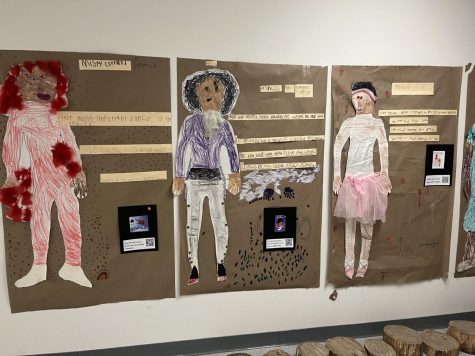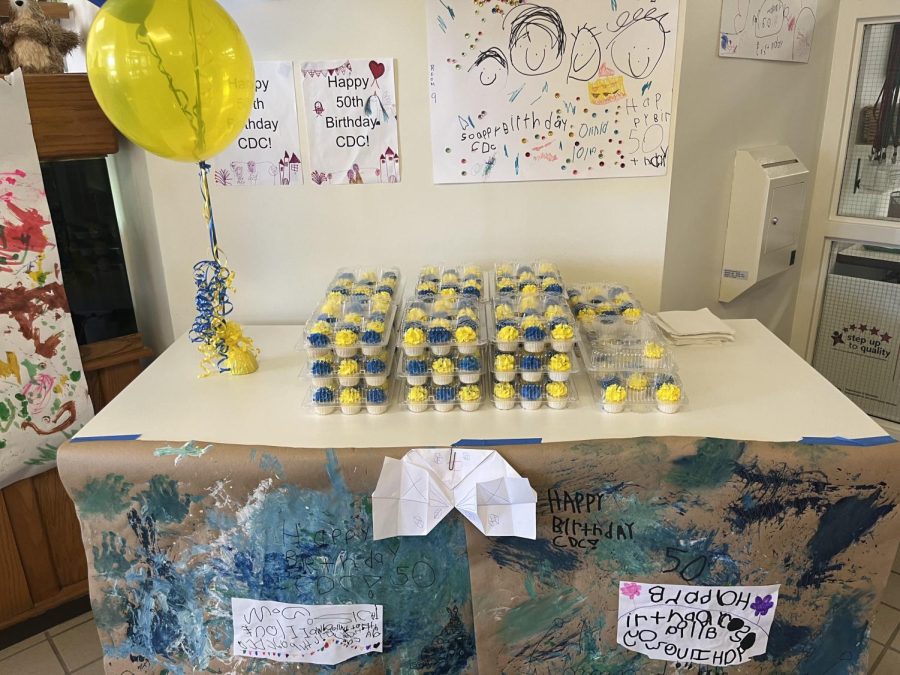Child Development Center’s 50 years of impact
The Child Development Center had a table of cupcakes to celebrate their 50th anniversary.
March 23, 2023
Former director Carol Bersani founded The Child Development Center in 1972. Its impact has been felt on campus in their 50 years of history.
The Child Development Center has programs for toddlers, preschool age and kindergarten age children. The center is also used for professional development and research for the College of Education, Health and Human Services.
Pam Hutchins, the current Director for the center, explained how the center got started.
“Carol Bersani, who was a faculty member at the time, really kind of started the school as the director and teacher with five children,” she said.
Prior to this, the only laboratory school on campus was the Kent State University School which taught K-12 children from 1914 until 1982.
In the first few years, Bersani was starting to shape what the center would become.
“When Carol was brought on, she was brought to enhance the preschool education program which is a part of childhood,” Hutchins said. “We were just starting to understand how important those early years were during the ‘60s.”
The school started out part-time and children either attended early in the mornings or later in the afternoons.
From those five children, the center has now grown to house about 150 children.
After 50 years of growth, the center has seen many changes.
“The University School closed in the ‘80s, and it is my understanding that at the time the CDC absorbed the kindergarten and nursery school from that in addition to the full time they were already offering,” she said.
Other changes include the full-time toddler programs, a location change and curriculum changes.
The Reggio Emilio program was also introduced during the mid ‘90s.
“Newsweek had written an article in one of their magazines about these high-quality early childhood programs out of Reggio Emilio, Italy,” Hutchins said. “They were determined to be the best preschools in the world.”
The Reggio Emilio approach stems from the understanding that every child is unique and expresses different interests. The approach focuses on children and teachers learning together based on experiences.
The program then gained traction in America and Bersani became involved in the Ohio movement to bring the teachings to the Childhood Development Center.
In addition to this, their connection with the early childhood program has strengthened over the years becoming one of their biggest strengths.
Early childhood education professor Julie Stoll said, “The strong connection that we have with the early childhood program because our philosophy has a similar philosophy that we teach preservice teachers.”

Executive Director Monica Miller Marsh explained the center’s mission.
“That’s an important thing when we talk about being a laboratory school it means we have a three prong mission. The first one of course is serving children and families.”
“The second prong of that mission is really preparing teachers to go out in the field so you’ll see teachers in all of our classrooms here,” she continued. “Then the third one is an emphasis on research and disseminating and spreading that information to the community.”
With these three prongs, the Childhood Development Center is also the first in the world to have a certificate in the International Baccalaureate Primary Years Programme.
International Baccalaureate Primary Years Program Coordinator Adonia Porto said this is one way their curriculum differs from others as it is also integrated with the Reggio Emilio program.
“The premise of IB or International Baccalaureate education is to encourage children to think for themselves and then also recognize where they exist in a global context,” she said.
According to Stoll, another way their curriculum stands out is their emphasis on outdoor education.
“In 2013, we got a wonderful gift of money from the university to develop what we call our outdoor learning lab.”
The outdoor learning lab is a space where children can play and learn.
“It’s not just a playground, it’s a huge space with different experiences that are offered to children that are carefully planned by our teachers here, and it’s a place where we can study how children engage with the outdoors,” she said.
The center is still working on ways to expand elements of their three prong mission.
Since their three prong conception involves spreading information to community, the center has observation rooms which researchers can utilize to observe children, a feature Miller Marsh wants more people to utilize.
“What we’re trying to do now is encourage not just our early childhood faculty but our faculty across campus and doctoral students to use this as a space to conduct research.”
At the moment there are numerous projects occurring from areas such as counseling and psychology.
Currently, the Child Development Center has a few funds where people can donate, such as the Robin McManus Scholarships fund which offers tuition aid so more children can attend the center.
The scholarship was created in McManus’ honor for the care she had for her students.
Adriana Gasiewski is a reporter. Contact her at [email protected].












